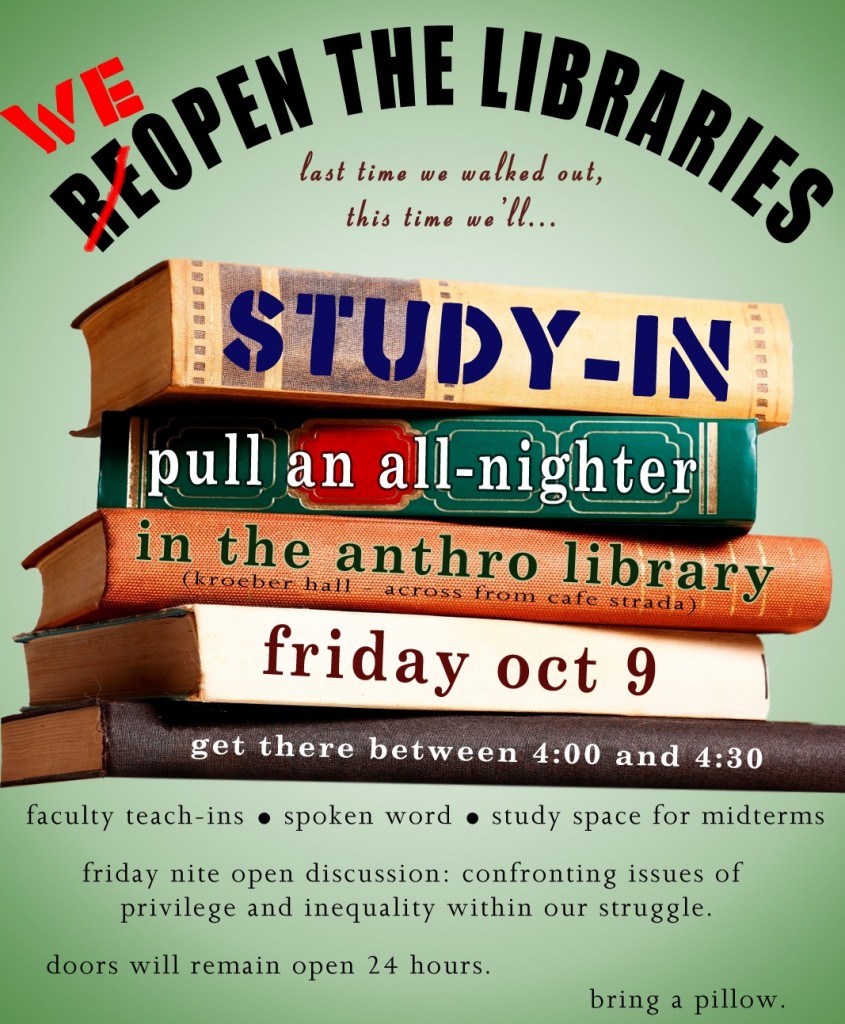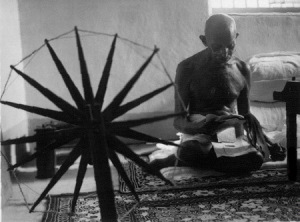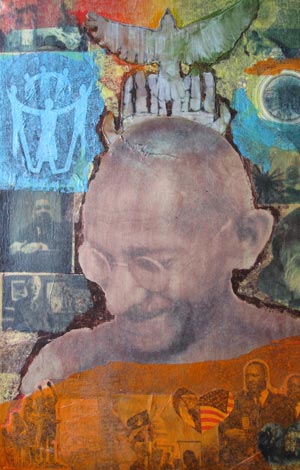The Search for a Nonviolent Future has been published in Arabic! Soon to be distributed in Syria, Morocco, Jordan, and Lebanon. We are also working on connections in — yes — Iraq, through our friends in La’Onf, and Palestine.
Metta’s Opinion
Metta and Young Spirit Foundation to reignite EFNV
![EFNV-Home-Gandhi[1] EFNV-Home-Gandhi[1]](https://archives.mettacenter.org/wp-content/uploads/2009/11/EFNV-Home-Gandhi11-261x300.jpg) How many of you know about Educators for Nonviolence? If you didn’t before, well, you do now.
How many of you know about Educators for Nonviolence? If you didn’t before, well, you do now.
Educators for Nonviolence (EFNV) is a sister project of the Metta Center, first started as a joint project between Metta and the Dalai Lama Foundation. The mission of EFNV is “to make the teaching and living of nonviolence part of mainstream education.” How great would that be??
EFNV has been in a period of incubation over the last year or so, since it’s most recent (3rd Annual) conference in the summer of 2008. In recent months, Metta has teamed with Young Spirit Foundation in an effort to update, fortify, and reignite EFNV as a potent force in nonviolence education.
While that effort is still underway (and planning for a 2010 EFNV conference in its nascent stages), it has been a joy to work with Young Spirit throughout the initial planning stages of this project. We look forward to working with YS further, and want to introduce you to them right now (if you haven’t heard of them already!!).
The first thing you can do to find out more about YS is visit the website. From there, you can read more about their programs and successes, find ways to get involved, check out their beautiful educational resources, and get inspired by all they have to offer.
The second thing you can do is spread the word about a November 21 benefit concert that Young Spirit is hosting as they celebrate plans for a new project-based charter school in Silicon Valley.
Third thing you can do is: stay posted and stay in touch! We’ll be announcing developments with the EFNV re-ignition extravaganza through the Metta site as they happen, so no need to worry. But if you are interested in being on the EFNV mailing list when it comes online, and therefore, being much more connected with the future of that project, let us know. Simply send an email to info@efnv.org and tell us you want to be on that upcoming list!
Thanks to Young Spirit for injecting the EFNV project with an incredible dose of passion and energy. Also thanks to EFNV’s current and previous partners and supporters, and to all of you who have written us numerous times asking, “Hey, when’s that next EFNV conference going to happen, anyway?” Your voices have been heard, and they will be answered.
Exploring viewpoints on the Truth of nonviolence.
‘But you see, if I stop at this point, I would merely be stating a fact and not telling the truth. You see, a fact is merely the absence of contradiction, but truth is the presence of coherence. Truth is the relatedness of the facts.“
-Martin Luther King, Jr., 1964
Have you been asking yourself how (or even if) nonviolence works? You’re not alone. You can find a lot of information about nonviolence on the Metta Center site, of course, and we hope you find answers here, especially those that help uncover the inner truths that are brought out through living a life of applied nonviolence (i.e. a life of experimenting with nonviolence.)
But the truth is, there are many truths about nonviolence (though they all lead to the same Truth, as Gandhi — or our President Michael Nagler — would remind us), and they all contain seeds of a deep understanding of shared human dignity. There is such a vast body of supportive and intelligent commentary on nonviolence out there, it would be an oversight not to share inspired work from other sources that can can answer the question: “Does nonviolence work? If so, how?”
With that in mind, here’s an article that does the kind of myth-dispelling analysis that we like to spread around here, an article by Stephen Zunes in Yes! magazine about the effectiveness and strength of nonviolence, the “weapon of the brave.”
Stephen doesn’t write for Metta, obviously, and he comes from (perhaps, perhaps?) a different school of thought about nonviolence than those of us who interpret nonviolence as, above all, a spiritual force. But what good are schools of thought, anyway, if they don’t bring us together? We can look to Stephen’s article not just for the facts he presents, but rather, as a call to examine the truths it represents, and to look for the coherence between the nonviolent argument and what we feel and know to be true inside. When we pay attention to what resonates with us, whatever that is, we take a step forward on the nonviolent path.
So check out the article here. See what resonates with you, and what doesn’t. Is nonviolence fact, or is nonviolence truth? Is it both or neither of these? Think about what nonviolence is for you. Then share.
Contagious Love Experiment
Hear the full audio of Josh and Conor’s Sunday presentation here:
[audio:2009_1108_ContagiousLoveExp.mp3]In striving for perfection, we could wait to put up this post until we’ve got just the right text or just the right photos, etc. But the truth is, the best thing we can do is get this up right away, so that we can share it with the world. The story will tell itself (just check out the audio).
Suffice to say that Josh and Conor had our group speechless several times Sunday evening, when they recounted their stories about being recruited, trained, and later, disillusioned by the US military system. These guys are an example of pure integrity and nonviolence in action! Please listen if you like, and share their story as it moves you.
Thank you, Josh and Conor. It was an honor to meet you, and we wish each of you peace and solidarity as you continue on your life’s journey. Peace!
P.S. For another look at Josh and Conor, and a strong dose of positivity…
A call for localism in nonviolent campaigns
![Students+Faculty+UC+Berkeley+Protest+Budget+N6cTlGgC1Ocl[1] Local action in Metta's own backyard -- the budget protests at UC Berkeley.](https://archives.mettacenter.org/wp-content/uploads/2009/11/Students+Faculty+UC+Berkeley+Protest+Budget+N6cTlGgC1Ocl1-300x189.jpg) Local action in Metta’s own backyard – the UC Berkeley campus protests, October, 2009
Local action in Metta’s own backyard – the UC Berkeley campus protests, October, 2009
Metta Center wishes to give voice to people who are fleshing out the fine points of nonviolent theory (and subsequent nonviolent action), by sharing thoughtful commentary on this topic when it comes our way. Here is a post from fellow peacemaker Barry Gan, which he recently shared with us and agreed to post to this blog. He’s asking us all to put our heads together to find collective, locally enacted solutions to our challenges, so see what comes to your mind as you read this, and feel free to share.
Thank you, Barry, for your thoughtful work!
I examined successful activism by reference to King’s and Gandhi’s most well-known successes and failures. Here is what I came up with.
First, we should not aim for national campaigns, which are generally too difficult to manage, but instead should promote well-designed local actions that are easily replicable so that they can become national in scope.
Second, we should not equate arrests and lawbreaking with genuine civil disobedience, that is to say, with noncooperation with a particular law or policy, a more effective tactic and strategy.
Third, our goals should be well defined. Ideally, they should entail the establishment of viable alternatives to the status quo, what Gandhi called constructive programs, so that, in the end, the goals are met whether or not the adversary yields.
Fourth, the (local, replicable) campaign should capture the public imagination by offering the adversary a choice: “Do as we wish, or make us suffer” and tailoring that choice in such a way as to create cognitive dissonance among those one opposes and, more importantly, among the undecided members of the population who usually comprise the vast majority of people. One creates cognitive dissonance by tailoring the local action in ways that appeal to the strongest values in the silent majority, values that conflict with what one’s adversary will be forced to do if they don’t acquiesce.
What these suggestions mean, concretely, is a tricky and creative matter. I don’t have any ideas yet, but I offer these observations in hopes that some of us might put our heads together to devise a local, replicable strategy to achieve a well-defined goal via constructive programs that create cognitive dissonance and launch a powerful local movement that will spread from city to city and thereby become national.”
Barry Gan is Professor of Philosophy and Director of the Center for Nonviolence at St. Bonaventure University. In 2005, along with Robert L. Holmes, Barry Gan published “Nonviolence in Theory and Practice” (Second Edition).
Opening Public Spaces: Study-in at the Library
 Pulling an All-Nighter to Transform the UC by some students, workers and faculty of UC Berkeley.
Pulling an All-Nighter to Transform the UC by some students, workers and faculty of UC Berkeley.
On September 24th, called to direct action by university faculty, workers and students, thousands walked out of the classrooms, offices, and labs at the University of California, Berkeley. We stood shoulder-to-shoulder on Sproul Plaza, in numbers not seen for decades. Our message bears repeating: “Whose university? Our university!”
Now, in defense of our university, in defense of public education, and in defense of our community, we’re opening the doors—and opening the books! As the Daily Cal reported on Monday, many campus libraries are being forced to close on the weekends due to budget cuts. We aren’t only losing our study space; major staff layoffs across the UC system mean that people are also losing their jobs. These libraries are the symbolic heart of the university. And the university will simply not survive if its heart beats only six days a week.
In response to this attack on education we are calling a “study-in” On Friday, October 9, at 4:30 pm in the anthropology library in Kroeber Hall. On this crucial weekend before midterms, when the doors of many campus libraries are supposed to close, we will say NO! We will stay, we will keep the doors open—and we will study for our midterms.
Happy Charkha Jayanti!
 Charkha Jayanti, or [[charkha|Spinning Wheel]] Birthday, was how Gandhi wanted October 2nd to be remembered. The spinning wheel was at the heart of Gandhi’s [[constructive program]] to free India through self-sufficiency and economic uplift. Gandhi had preferred that rather than being used to celebrate his own image, his birthday be used as a celebration of the constructive work that he put in motion. On this Charkha Jayanti may we all honor Gandhi’s legacy by continuing the great experiment of global nonviolent change!
Charkha Jayanti, or [[charkha|Spinning Wheel]] Birthday, was how Gandhi wanted October 2nd to be remembered. The spinning wheel was at the heart of Gandhi’s [[constructive program]] to free India through self-sufficiency and economic uplift. Gandhi had preferred that rather than being used to celebrate his own image, his birthday be used as a celebration of the constructive work that he put in motion. On this Charkha Jayanti may we all honor Gandhi’s legacy by continuing the great experiment of global nonviolent change!
The ‘Real’ 9/11: a Celebration
 Some of you may know that this is the 103rd anniversary of the birth of [[Satyagraha]]: September 11th, 1906 at the Empire Jewish Theater in Johannesburg, South Africa. Not the birth of the principle, which as Gandhi said was already ‘as old as the hills,’ but the launching of his mighty ‘experiments with Truth’ — in this case the power of Truth in political struggle. And what was — and still is — that truth? Simply put, that all life is an interconnected whole, and that the man or woman who becomes aware of and acts in accordance with that truth wields enormous power for wisdom and justice. (Our latest definition of violence is ‘the failure to recognize the unity of life’, and of [[nonviolence]] is ‘the awakening of that living recognition’.
Some of you may know that this is the 103rd anniversary of the birth of [[Satyagraha]]: September 11th, 1906 at the Empire Jewish Theater in Johannesburg, South Africa. Not the birth of the principle, which as Gandhi said was already ‘as old as the hills,’ but the launching of his mighty ‘experiments with Truth’ — in this case the power of Truth in political struggle. And what was — and still is — that truth? Simply put, that all life is an interconnected whole, and that the man or woman who becomes aware of and acts in accordance with that truth wields enormous power for wisdom and justice. (Our latest definition of violence is ‘the failure to recognize the unity of life’, and of [[nonviolence]] is ‘the awakening of that living recognition’.
As Pancho said in the ‘Hope Tank‘ discussion this morning, this is not India’s or U.S.’s, it is humanity’s holiday. Yet so few of us humans are aware of it. If we were, we would be well on our way to a nonviolent future. That is the work of Metta, and many of us around the world: to make humanity aware that it has a brilliant, nearly untapped potential, a cause fully worthy of our life. Our booklet, Hope or Terror, is available to download on this site as a gift we are giving to the Earth Community; and we are here to work with you and offer you opportunities to work with us in liberating that potential.








